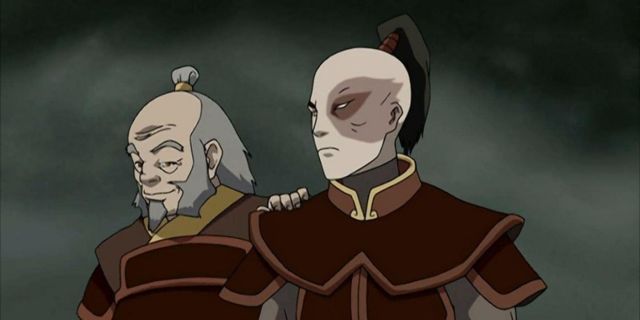Despite their similar upbringings, Zuko and Azula wound up in different places by the end of Avatar: The Last Airbender. Though he tried to be as ruthless as his sister, Zuko’s compassion stood out more — a trait not welcomed by his father and other military leaders of the Fire Nation. He had Iroh to support him along his journey to find redemption and inner peace, but this influence alone could never be enough to make a difference for Zuko.
Before the events of the series, Zuko is banished from his country after speaking against military leaders and refusing to fight his father during the Angi Kai match that followed. His father’s merciless discipline leaves a physical and emotional scar on Zuko, reminding him he is a failure in his father’s eyes. Though this is seen as a negative, in hindsight, that failure to uphold the Fire Nation’s merciless ways along with the struggle of his banishment is what prevented Zuko from an even worse fate.
Zuko’s Failure as a Villain Makes All the Difference

As the son of the Fire Lord, Zuko had many expectations placed on him since birth along with his younger sister Azula. The only difference between their upbringings is that Azula fits into the Fire Nation’s ruthless culture, while Zuko proves his strength is in compassion and emotional intelligence. As a result, Zuko is considered a failure and is sadly punished for his kind nature.
Although he has to undergo excruciating pain in order to escape from his family’s brutality, his banishment was in some way the best thing for him to grow. Away from home, Zuko is given the chance to see the world and a new perspective. As he begins to change, it’s his pain from failure as well as his naturally compassionate nature that helps him sympathize with others outside his country. This encourages him to go against his father in the end and save peace throughout the four nations, for everyone across the world.
Along his journey, Zuko has Uncle Iroh to guide him through his metamorphosis. In this way, Iroh plays a crucial role in the boy’s story, but his influence would have never shone through if Zuko was a successful villain. If he’d acted the way he was expected to from the start, he wouldn’t have paid Iroh any special notice — nor would he have been given the chance to gain new perspectives, which was one of the benefits of his banishment. From his failure to fit under the standards of mercilessness, Zuko has to choose his path for himself. The struggle he endures from his journey in The Last Airbender molds him into a great hero with the most powerful strength.
Zuko’s Failure Gives Him More Maturity and Resilience Than Azula

Ruthless villainy may have come easy to Azula, but the rewards she reaps from her success only take her so far. Because she always succeeded and was given everything she wanted, she became spoiled. Unlike Zuko, who had to build strength in resilience, Azula would crumble under the pressure of things not going the way she wanted. With her brother’s heightened maturity, he’s able to bounce back from failure while Azula would succumb to a mental break. Part of this difference is due to Zuko’s relentless failures and being forced to learn from them — but an even bigger difference maker is their levels of independence.
Zuko never met his father’s expectations until close to the end of the series, which he then realized wouldn’t give him the happiness he thought he always wanted. After gaining a wider perspective on the world and seeing his own worth without that recognition, Zuko attained independence during his banishment. The same cannot be said for Azula, who relied on their father’s approval as the sole reason behind all her decisions. While Zuko was being forced to grow due to his perceived failures, Azula’s victories as a villain only held her back from growth and attaining independence.
When Zuko unexpectedly faced his father in Agni Kai, Ozai shares a piece of advice that would forever change Zuko’s life, “You will learn respect. And suffering will be your teacher.” Ironically enough, Fire Lord Ozai was correct: Zuko learned about respect and suffering taught him a lot, but not in the way his father had hoped. From his banishment, Zuko learned to respect others and, in turn, how to respect himself against his father’s ideals. This would have never happened if he lived up to his father’s expectations as Azula did. It’s because he failed and was molded by struggle and suffering that Zuko became a great hero and found true happiness in the end.















Leave a Reply